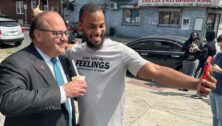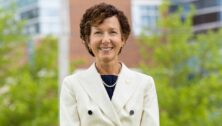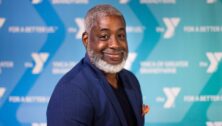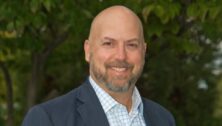Philadelphia Leadership: Dr. Michael Mittelman, President, Salus University
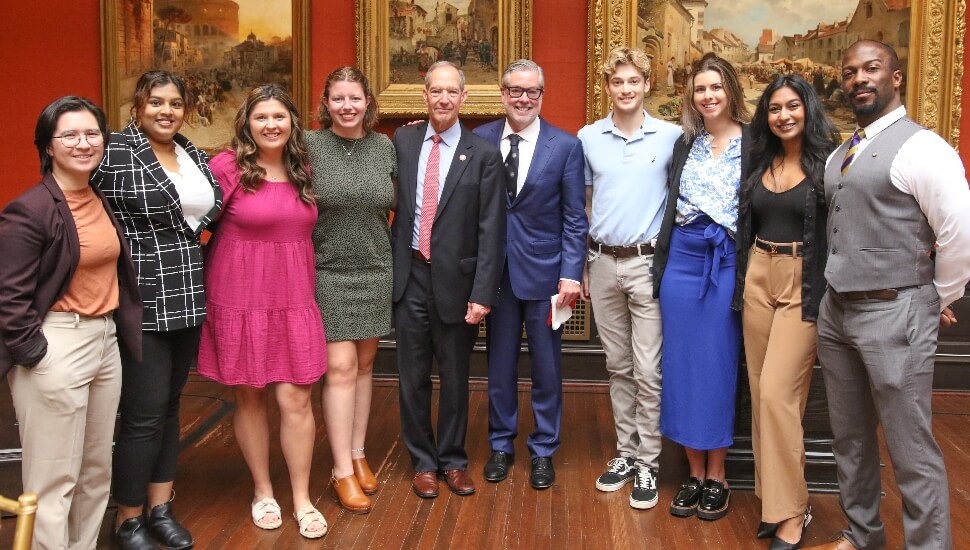
Dr. Michael H. Mittelman, president of Elkins Park-based Salus University, spoke to PHILADELPHIA Today about growing up in Long Island, where he rode his bike to neighboring towns with his best friend.
As a teenager, he was involved in theater and choir and got to see first-run Broadway shows during a theater appreciation class.
After participating in NROTC and becoming an optometrist, Mittelman spent decades in the U.S. Navy, ultimately becoming the deputy surgeon general of the U.S. Navy. He discussed why he took the job as president of Salus over 10 years ago and what to expect from Salus’s upcoming merger with Drexel University.
Where were you born and where did you grow up?
I was born the oldest of two children in the Bronx and grew up in Long Beach Sound on Long Island. I was 5 years old when we moved to Long Island.
What did your mom and dad do for a living?
My mom was a clerical person. She worked for the city of New York for a while, and she was a stay-at-home mom for a good bit of our childhood.
My dad was a haberdasher. He owned a men’s clothing store in Manhattan, and I got to work there for $20 a day.
What memories stay with you from growing up in Long Beach?
I remember being able to ride my bike all over the place. My best friend and I were explorers. We would ride over to see my aunt in the neighboring town of Lawrence. It was probably a 20-mile bike ride. You had to go over a bridge and pay a toll.
And here’s the neat thing – we never had to ask permission, and we always felt safe.
Did you play any sports in high school?
I played soccer and tennis. I was better at tennis than I was at soccer. My soccer team was the first one our high school fielded. We had a perfect season our first year, but it wasn’t on the right side of perfect! But our next season, we did very well. We had a fabulous coach.
When I was in the Navy years later, I had the opportunity to attend a tennis clinic Billie Jean King put on in Marbella, Spain. There were two of us on our side of the court up against King on her side of the court. She was very patient with us, and while I did return one of her backhand shots past her, I couldn’t return her serve.
Besides working for your dad, did you have any other part-time jobs?
During the summer, I worked at a camp. In college, my first real job, I worked for my best friend’s dad. They owned Friendship Dairies. I loaded cottage cheese in the back of semis and then helped deliver it. It was hard work, but it was the most money I’d ever seen, and it taught me work ethic and being on time – although my dad also taught me work ethic.
My dad used to tell me, “Somebody’s paying you. You work because you’re getting paid. That’s the value you bring to a business.”
Did you do anything else in high school other than sports?
I was the school photographer, along with my best friend. And I did theater – mostly technical stuff, but they got me on stage a couple of times. And I was in the choir.
What about music? You can’t have grown up when we grew up without music playing a role in your life.
Broadway music was my big thing. I had a theater appreciation course in high school. Our teacher was well-connected to Broadway, so once a month, we’d go in and see a Broadway show. We’d go backstage and meet people. We saw first-run plays – 1776, Hair, The Rothschilds, To Kill a Mockingbird. We got to interview the producer or the director – “How did you do this?” “What does the storyline mean?” It was fabulous, and I gained an appreciation for that.
I was also a big Beatles fan. Not so much Springsteen, although when I was on active duty, I was asked to represent the United States Navy at a big fundraiser at Radio City Music Hall. They had all these stars – Robin Williams, the newscaster Brian Williams, Bruce Springsteen, and others.
I got to go to the VIP cocktail party. I talked to Robin Williams for a while, which was fabulous. Then, Bruce Springsteen walks up to me. We started talking, and he said, “We look like we’re about the same age.” I said, “Yeah.” He said, “Did you listen to my music?” I said, “Well, to tell you the truth, I wasn’t really a fan. It was an acquired taste.” He cracked up.
Nobody had ever told Bruce Springsteen that he was an “acquired taste” before!
That’s what he said. And we sat there and talked for 20 minutes. We had a lot in common. And I love his music now.
You could have gone anywhere to college. Where did you go, and why there?
I went to Jacksonville University in Florida. One, because I wanted to move away from home, and they had a wonderful pre-med biology program that my cousin had told me about. And they had NROTC, and I had an NROTC scholarship. It was a small school – I didn’t want a large school. It was great – the biology program was great, and I made lifelong friends.
Why medicine? You chose medicine early on.
I was interested in architecture, engineering, and healthcare. My cousin went to dental school, so that had an influence on me. My cousins and I were very close. And my mother’s dad was a dental technician, so dentistry was where I was supposedly headed. I got accepted to dental school at Emory University in Georgia, went up there to see it, and said, “This is not for me.” Working in people’s mouths is not my thing.
At that point, I didn’t know what I wanted to do. My college roommate’s dad was an optometrist, and he said, “You should think about optometry.” I went to see his dad’s practice in Washington D.C. and discovered his dad was Lyndon Johnson’s optometrist. So, it was a very unusual practice. After the visit, I decided I wanted to be an optometrist and I wanted to go to school where my friend’s dad went to school, Pennsylvania College of Optometry, which is why I ended up in Philadelphia.
Was Pennsylvania College of Optometry a good fit for you, looking back?
Yes, it was. The school was great. The education was second to none. The rest is history, as they say.
Coming out of College, Michael, who saw promise and potential?
A lot of people. Our first duty station, an officer named Jerry Patee befriended me. He was senior to me by several years but that didn’t matter. We used to run together. Somehow, he saw promise in me. That’s the way the Navy works. You have mentors and folks who just look out for you. I was lucky enough to have several folks like that. You don’t do any of this by yourself. They’re very complex systems, and there’s a little bit of luck involved.
When I got selected for admiral, Jerry called me, and at this point, he had known me for 20-something years. In our corps, they only pick one admiral every three years, and it’s never a clinician, so I was surprised. Flag Officer for the Medical Service Corps had always been a healthcare administrator. I was the first, and to this date, only clinician to be selected for this position. Jerry said, “Mike, you have an edge to you. In this new job, you’ve got to figure out how to work around that.”
But that edge helped you get things done.
It did. In this new role, where I was the leader of 31 specialties, I needed to listen and not be the mover and shaker all the time.
At the same time, I had the tutelage of Vice Admiral Mike Cowan. Mike befriended me 20 years prior as well when I was at my second duty station. He took me under his wing. He pushed me to learn and then eventually teach advanced cardiac life support and do things that optometrists generally weren’t doing.
When I was on my command tour in Japan, he was the Surgeon General of the Navy at the time. At that point, I had been in the Navy for 23 or 24 years, and I thought I was going to retire. I’m at the top, I’m a Navy captain, I was running a hospital. I was very happy. Mike puts his arm around me and said, “You’re going to come work for me in Washington.” I said, “No, I’m not.” And he said, “Yes, you are.” And I did.
Mike told me a similar thing to what Jerry had told me and that was to, “Be gentle with people.”
How did you get to Salus University?
That’s another interesting story. Salus gave me an honorary degree several years ago, so I spoke at graduation and spoke to the board chair. They told me the then-current president, Tom Lewis, was going to be retiring in a few years and that I should think about it, but I said, “No, not on my radar.”
I did teach at the Uniformed Services University periodically, but I’m not an academic. I was enjoying myself in the Navy. I was the deputy surgeon general, and we were making big changes and doing important things. The U.S. Navy Medical Service Corps has 64,000 people, so we were pretty busy.
Tom called me and said, “I’m retiring this year. You should apply for the job.” I went home and talked to my wife. She said, “Well, you can’t stay in the Navy forever.” Then I went and talked to the Navy surgeon general at the time, Matt Nathan, who was a good friend of mine. He said, “Why not? It’s a pretty good gig.” And I talked to John Greenert, who was the chief of Naval Operations. He said, “I’ve always wanted to be a college president.”
I said, “Are you guys trying to tell me something?” He said, “What have you got to lose?” I went through the process, and then I got the phone call. I’ve been here over 10 years now. I got to campus in 2013.
What are you focused on in 2024?
We’re planning a merger with Drexel University. We’re a healthy institution, but we recognized that as you look over the horizon, maybe 15 years from now, it’s going to be hard for small schools like us to attract good students. We’re starting to see some of that now.
I must have gotten phone calls from six schools saying, “Hey, are you interested in merging?” We’re a graduate health science school, and people are looking to grow health science careers. The one that really piqued my attention was when John Fry called from Drexel. I knew Drexel’s reputation for innovation and community service, and I knew what John was doing in University City.
We thought this was going to be relatively simple. You get the accreditors’ approval, the secretary of state says yes, Orphans’ Court says yes, done. The federal Department of Education changed the rules just as we went down the path, so now, instead of a one-step process, it’s a two-step process. If all goes as planned, on June 30th, the corporate merger will occur, and we at Salus become Drexel employees.
But educationally, we cannot co-join the programs. So, for financial aid purposes and other reasons, we can’t combine those until the Department of Education says that we can. Primarily, they’re looking at the financial health of both institutions to ensure that the students don’t catch the short end.
So, as that process unfolds, what are the challenges and opportunities you’re focused on this year?
I’m focused on ensuring that the folks in my Salus University family are comfortable moving forward. As in any merger, the benefit packages are different.
The culture is different.
The culture is very similar. Yes, they are larger and more complex but our core values are very much aligned, which is one of the things that attracted us to Drexel and vice versa. Both institutions are very community-focused. We’ve been in communities for 30 years doing school screenings. Our clinic is in an underserved area. It provides a great education for our students, but it also provides a great service for the community.
Drexel does the same thing. And as you merge our professions with theirs, the only one we overlap in is Physician Assistant, and there’s a great need for both. They will remain two separate programs, one in Montgomery County and one in University City, but we’ll be training a lot more than just one of us could.
So, Salus’ campus will remain in Elkins Park?
Yes, at least for five years, and maybe more. It’s important to be in Montgomery County because that’s where the growth is right now. You have financial resources there. It’s accessible, it’s safe, and it provides an alternative opportunity for students who want to go to Drexel University. And for us, it provides an alternative for our students who want to come into the city.
What do you do with your free time, Michael?
Nowadays, I don’t have much free time, but I work out a lot. I’m kind of a triathlete – I used to be more of a triathlete. I do workout almost every day which helps me navigate the issues I’m confronted with daily. I’ve also started playing with model trains of late. My daughter accuses me of becoming a train hobbyist. It’s relaxing – I don’t have to think about anything.
Finally, Michael, what is something big that you’ve changed your mind about over the last five or 10 years?
I’m a public health guy. When I came to Salus, they had an online public health program that I fully supported. I was actually an advisor when I was on active duty, helping the university establish it. When I got here I learned that it was not accredited and it would take a great deal more effort to get there so I sunsetted the program. Many did understand why, but I felt that the quality of the program was not up to Salus’ standards. It was a 180-degree shift from my original position but it was the right decision at the time.
For me, it was all about quality and experience. If you can’t teach experientially, real-world stuff, the program is worthless, especially in that realm. That was a difficult decision, and I had to make some difficult personnel decisions when I made the decision.
What keeps you hopeful and optimistic, Michael?
I’m not as optimistic as I used to be, given the current geopolitical situation as well as the polarization that’s occurred in our own country. What does give me optimism are the young men and women who I’ve seen working in healthcare, our students and in particular the young Navy Corpsmen and Army Medics who have performed with honor and courage in the field.
There’s nothing wrong with this generation. These young Corpsmen and Medics saw what they needed to do and saved lives doing it. Unfortunately, many gave their own lives in performing their duties. They’re dedicated, energetic, smart, and mission-oriented. That gives me hope – And then there are my own daughters who all are engaged in jobs that revolve around helping others, with little regard for themselves.
I mentioned our students earlier. Most recently, much to the chagrin of several, I use the analogy with my faculty that we’re a business. Like any other business, we have customers, who just happen to be our “students.” I asked the faculty to look at what happened with Blockbuster, Eastman Kodak, and Sears, and then look at what happened with Netflix. Each had customer bases that drove their businesses. Three of those companies did not change the way they provided their service to their customers, even though their customers changed over time. They went belly-up. Netflix did. They adapted very quickly.
In higher education, our customers – our students – have changed over time. The pandemic has accelerated that change, but it’s not all because of the pandemic. Students and their parents are shopping for education, so they’re looking at price and different things than we did. Many are also working and raising families while in graduate school. How might we help them earn a living in their chosen profession while they train for the professional degree? As a sector, we have to change and be more agile.
Finally, Michael, what’s the best advice you ever received?
It’s from Mike Cowan. He said, “Be gentle with people.” Even in my current role, I have to remind myself of that, because I do tend to get impatient. I read the Stoics every night. That’s something Jim Mattis taught me when I worked for him. He often read Marcus Aurelius’s Meditations.
One of the things Aurelius talks about is that anger is a sign of weakness, and if you lose your temper, you’re just showing your weakness. Mike Cowan and Jerry Patee were telling me the same thing. In the end, it’s how we interact with others that leads to success. It develops relationships. Unless you’re polite, that doesn’t happen.
Connect With Your Community
Subscribe for stories that matter!
"*" indicates required fields





















